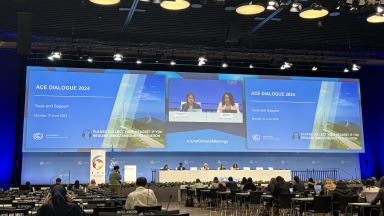Climate and Sustainability in national and international Processes

ClimAct focuses on participation in and understanding of political forums that aim to drive climate action, with a particular emphasis on the United Nations Framework Convention on Climate Change (UNFCCC) and the Climate and Clean Air Coalition (CCAC). As participants in these political processes, ClimAct facilitates and shapes transformations towards sustainability within the framework of the Paris Agreement and the SDGs. At the same time, ClimAct adopts a critical posture in examining how such national and international political processes advance transformations toward sustainability. A core area of ClimAct expertise is in the linkages between air pollution and climate change - the combination of which was recently ranked as the top threat to global health.
What can an integrated approach to air pollution and climate change achieve?
ClimAct combines perspectives from the natural and social sciences with "real world" experience in political practice to examine the potentials and limits of an integrated approach to air quality and climate change in the context of broader political goals. Key to ClimAct's perspective is our participation in and study of the CCAC. Researchers consider questions such as: Can local action on air pollution be leveraged to raise ambitions for international climate goals? Can smaller initiatives contribute to efforts to fulfil the Paris Agreement targets? What governance role does the CCAC play within the climate policy landscape?
Building bridges between science and international climate politics
ClimAct brings its inter- and transdisciplinary perspective to questions of climate and air quality governance and develops policy recommendations. The team uses international forums such as the UNFCCC and the CCAC as platforms for convening participatory and co-creative dialogues with actors from science, policy, and civil society.
















































